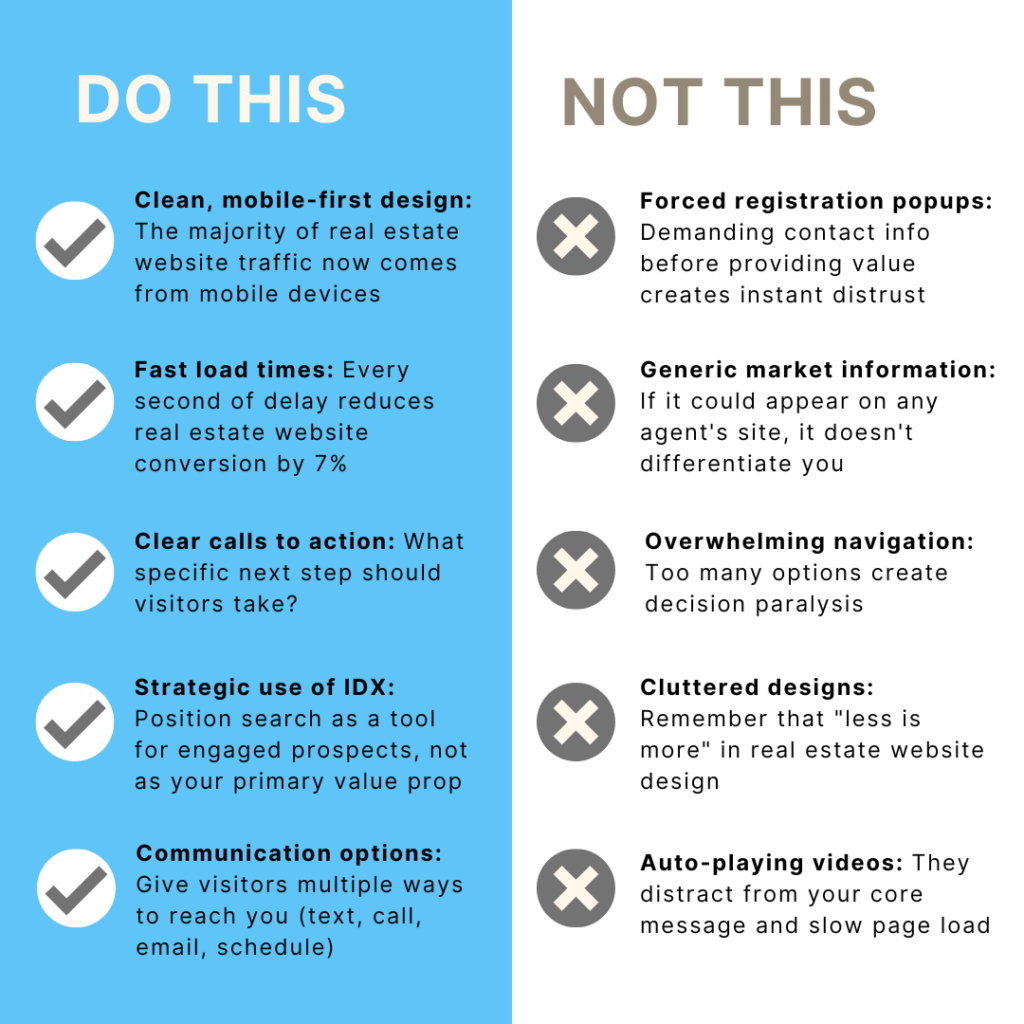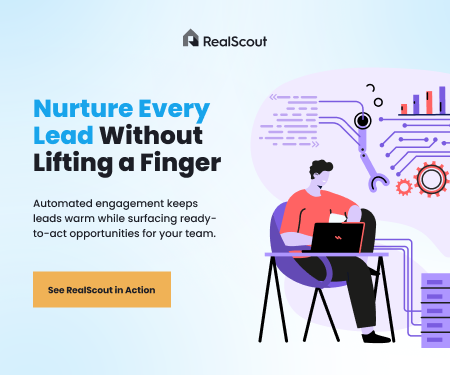A potential seller in your market sits down at her kitchen table, opens her laptop, and begins researching real estate agents. She visits the first agent’s website and is immediately greeted by a giant search box asking her to “Find Your Dream Home.” She clicks away. The second site? Another search box. The third? You guessed it.
By the time she’s visited five different agent websites, they’ve all blurred together in her mind—identical digital business cards offering the same generic experience. None has answered her most pressing question: “Why should I choose you to sell my home?”
This scenario plays out thousands of times daily across the country. While most agents continue to follow an outdated digital playbook, savvy real estate professionals are reimagining their online presence to create real estate websites that convert visitors into leads and clients.
In this guide, we’ll examine why traditional real estate website design approaches fail to deliver results and outline a comprehensive strategy for creating high-converting real estate websites that stand out from national portals and competing agents.
Key Takeaways
- Lead with value, not search. High-converting real estate websites position your unique value proposition above the fold instead of a generic IDX search box that mimics national portals.
- Focus on the “final payoff.” Effective websites communicate the ultimate benefit clients receive from working with you, not just the services you provide or features you offer.
- Build for strategic conversion, not engagement. Rather than trying to keep visitors searching on your site, design clear pathways that convert them into leads with targeted content and compelling calls to action.
- Optimize for mobile-first experiences. With 68% of real estate searches starting on mobile devices, prioritize tap-friendly navigation, location-based personalization, and progressive disclosure of information.
- Measure what matters. Track conversion rates, not just traffic or time on site, to ensure your website is actually generating business rather than just looking attractive.
Why Most Real Estate Websites Fail
The IDX Predicament
For decades, agents have been told that an IDX search box is essential for real estate website conversion. The logic seemed sound: give visitors what they want (the ability to search listings) and they’ll stick around. But research from 1000Watt reveals a startling reality:
- When asked about the primary reason for having IDX home search on their website, 35% of agents said they want their clients to search for homes on their site, despite evidence that consumers prefer national portals.
- Even more telling, 25% of agents admitted they “don’t have a defined purpose or strategy for having IDX.”
As real estate branding expert Mark Davison points out: “99% of every agent, broker, real estate entity website begins with an IDX search box, which basically is their value proposition.” But how can you build a distinctive brand when your first impression is identical to every other agent’s?
The Consumer Behavior Reality
Consider these uncomfortable truths about real estate website conversion:
- The average visitor spends less than two minutes on real estate websites
- Most consumers already have Zillow, Redfin, or Realtor.com apps on their phones
- Even if they start a search on your website, they’ll likely drift back to national portals for a more comprehensive experience
The conclusion is clear: leading with IDX search doesn’t create a competitive advantage—it positions you as an inferior alternative to the platforms consumers already prefer, damaging your real estate website conversion rates.
Creating a Value Prop That Converts
Finding Your “Final Payoff”
Instead of leading with a generic search tool, high-converting real estate websites lead with a clear, compelling value proposition that addresses the “final payoff”—the ultimate benefit clients receive from working with you.
The final payoff isn’t about what you do (helping clients search for homes); it’s about what your clients get (peace of mind during a complex transaction, financial security, a home that fits their lifestyle perfectly).
To identify your final payoff for better real estate website conversion, complete this statement:
“[Your name] is a [your category] for [your ideal clients] by [your unique approach] so they can [immediate benefit] and [ultimate payoff].”
For example:
“Sarah Johnson is a residential real estate advisor for first-time homebuyers in Denver, providing education-first guidance so they can avoid costly mistakes and build generational wealth through homeownership.”
This kind of positioning immediately differentiates your real estate website design and speaks directly to your ideal client’s deepest desires—a stark contrast to the generic “search homes here” approach.
Building a High-Converting Website Structure
1. Lead with Your Value Proposition, Not Search
Your homepage should immediately communicate:
- Who you help (your ideal client)
- How you help them (your unique approach)
- Why it matters (the final payoff)
This could be as simple as: “Don’t settle. In the last 12 months, I’ve helped 124 families buy homes in San Marino, and I’ve learned one thing: you need to know what to compromise on and what not to. My job is to make sure you never settle.”
This approach immediately improves real estate website conversion by communicating value rather than pushing a generic utility.
2. Strategically Incorporate Social Proof
Rather than generic testimonials buried at the bottom of your page, high-converting real estate websites feature social proof that reinforces the value proposition:
- Client success stories that highlight your unique approach
- Before-and-after scenarios (what clients were struggling with before working with you, and the outcome after)
- Specific metrics that demonstrate your expertise (average days on market, sale-to-list price ratio, etc.)
3. Create Content Hubs for Better SEO and Engagement
Instead of random blog posts, build content hubs around the specific concerns of your ideal clients to improve your real estate website conversion:
- For first-time buyers: A comprehensive guide to the entire purchasing process
- For sellers: A guide to maximizing home value through strategic improvements
- For luxury clients: Insider information on exclusive neighborhoods
Each hub should position you as the expert in that specific niche and provide genuinely valuable information that can’t be found on national portals.
4. Incorporate Video Strategically
Video is powerful, but must be used purposefully on high-converting real estate websites:
- Your introduction video should focus on your clients’ challenges and how you solve them, not just your credentials
- Property videos should help visitors envision themselves in the space, not just showcase your face walking through rooms
- Neighborhood videos should provide insider information that can’t be found on national portals
When reviewing agent websites, one marketing expert noted, “I want to see me walking around this property, and I can’t see me if you’re in the way.”
Modern Real Estate Websites

Mobile Optimization Strategies
With over 68% of real estate searches now starting on mobile devices, optimization is critical for high-converting real estate websites:
1. Location-Based Personalization
Use geolocation to customize content based on the visitor’s location automatically:
- Show nearby listings first
- Feature neighborhood information relevant to their current area
- Adjust pricing information to match local market conditions
2. Click-to-Call Optimization
Make it effortless for mobile users to contact you:
- Ensure your phone number is tap-accessible on every page
- Use sticky headers that keep contact options visible while scrolling
- Implement SMS/text options for those who prefer not to call
3. Progressive Disclosure for a Better Mobile Experience
Mobile screens have limited space. Use progressive disclosure to reveal information as needed:
- Start with high-impact visuals and your core value proposition
- Allow users to expand sections they’re interested in
- Save detailed information for dedicated pages that visitors can visit when they’re ready
4. Mobile-Specific Tools That Convert
Offer tools specifically designed for mobile house-hunting on your real estate website:
- Driving tour functionality that maps routes between properties
- AR features that help visualize furniture placement
- Neighborhood walkability scores and points of interest
Implementation Guide: Your 30-Day Website Conversion Plan
Week 1: Strategy and Value Proposition
- Define your ideal client and their primary challenges
- Craft your unique value proposition using the formula provided
- Document your “worldview” (what you believe is wrong/right about real estate)
Week 2: Content Development
- Create your core homepage messaging for better real estate website conversion
- Develop at least one complete content hub
- Record a client-focused introduction video
Week 3: Design and Technical Setup
- Implement mobile-first real estate website design principles
- Integrate strategic IDX placement (if necessary)
- Set up analytics to track visitor behavior
Week 4: Launch and Optimization
- Test across multiple devices
- Implement heat mapping to analyze user behavior
- Establish an ongoing content calendar
Creating a Real Estate Website That Actually Converts
The traditional real estate website approach—dominated by IDX search—is showing its age. As more consumers begin their home search on national portals, simply offering a less robust version of the same experience won’t win you business.
By leading with your unique value proposition, creating genuinely helpful content, and thoughtfully integrating search tools rather than leading with them, you can build a high-converting real estate website that not only attracts visitors but converts them into leads and clients.
Your website should be more than just another place to search for homes—it should be the digital embodiment of your unique value and the beginning of a client relationship that will generate referrals for years to come. That’s the true measure of real estate website conversion success.





